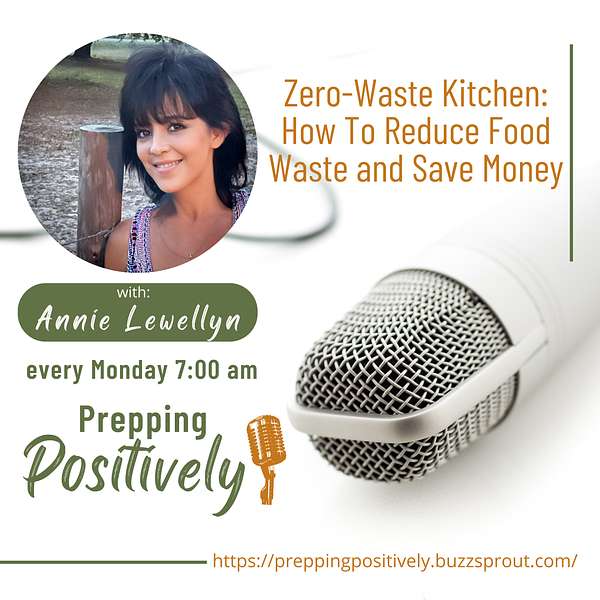
Prepping Positively
Prepping skills taught on a positive note. From growing your own food and stocking a prepper pantry, to providing your own water and electricity and making your own natural remedies, learn the prepping skills you need to sustain you and your family through any crisis.
Prepping Positively
Zero-Waste Kitchen: How to reduce Food Waste and Save Money
Learn how to save money and embrace a more sustainable lifestyle with these tips for you to save money and reduce waste too.
Being self-reliant isn’t just about reducing our environmental footprint; it's also about saving money and embracing a more sustainable lifestyle. So, grab your reusable bags, and let's embark on this eco-friendly journey and talk about a zero-waste kitchen!
Welcome to another episode of Prepping Positively! I'm Annie, and today we're diving into the wonderful world of the zero-waste kitchen.
So let’s talk about why zero waste matters.
First things first, why should we care about reducing food waste in our kitchens? Well, did you know that in the United States alone, up to 40% of our food is wasted each year? That's not only a massive environmental issue but also a significant strain on our wallets. By adopting zero-waste practices, we can cut down on our grocery bills and do our part to combat food waste.
Let's get practical! Here are 7 simple yet effective tips for reducing food waste in your kitchen:
1. **Meal Planning:** Plan your meals for the week ahead, and only buy what you need. This helps prevent impulse purchases and ensures you use up everything you buy. You get extra brownie points if you use those coupons too!
2. **Smart Storage:** Invest in airtight containers and storage solutions to keep your food fresh for longer. Proper storage can extend the shelf life of your groceries and minimize spoilage.
Consider a jar sealer or even better a vacuum sealer. You can also consider dehydrating many foods that you may have an abundance of or that won’t be used before they go bad.
3. **Love Your Leftovers:** Get creative with leftovers! Turn last night's dinner into today's lunch or repurpose ingredients into new dishes. Leftovers are a treasure trove of possibilities.
4. **Composting:** Start a compost bin for food scraps and organic waste. Composting not only reduces landfill waste but also creates nutrient-rich soil for your garden.
From outdoor composters that can sit on or beside a deck, to the smaller ones that sit on a countertop, get some extra use out of those scraps by turning them into food for your gardens.
5. **Use the Whole Ingredient:** Embrace nose-to-tail and root-to-stem cooking. Use all parts of vegetables, fruits, and meats to maximize your ingredients and minimize waste.
6. **Freezing:** When in doubt, freeze it! Preserve perishable items like fruits, vegetables, and bread by freezing them for later use. It's like hitting the pause button on food spoilage.
You can also learn the wonderful craft of freezer cooking. With this method you buy bulk food, then make as many meals and or snacks as you can ahead of time. This method can reduce leftovers because it can be frozen in individual portions.
7. **Donate Excess:** If you have surplus food that you won't use, consider donating it to a local food bank or sharing it with friends and neighbors. Sharing is caring, after all!"
By implementing these zero-waste practices in your kitchen, you're not only reducing food waste and saving money but also contributing to a healthier planet. Every small step counts, and together, we can make a big difference."
Thanks for tuning in to today's episode of Prepping Positively! I hope you feel inspired to embrace a zero-waste kitchen and enjoy the benefits of reducing food waste in your home. Remember, every little action adds up to create positive change. Until next time, stay positive, stay prepped, and keep spreading those good vibes!
You will find links to my posts that relate to this episode in the show notes if you wish to learn more about food preservation and zero-waste practices.
If you enjoyed this episode, please subscribe, leave a review, and share it with your friends. Stay inspired, stay self-reliant, and until next time, this is Annie signing off. Happy dreaming and achieving!